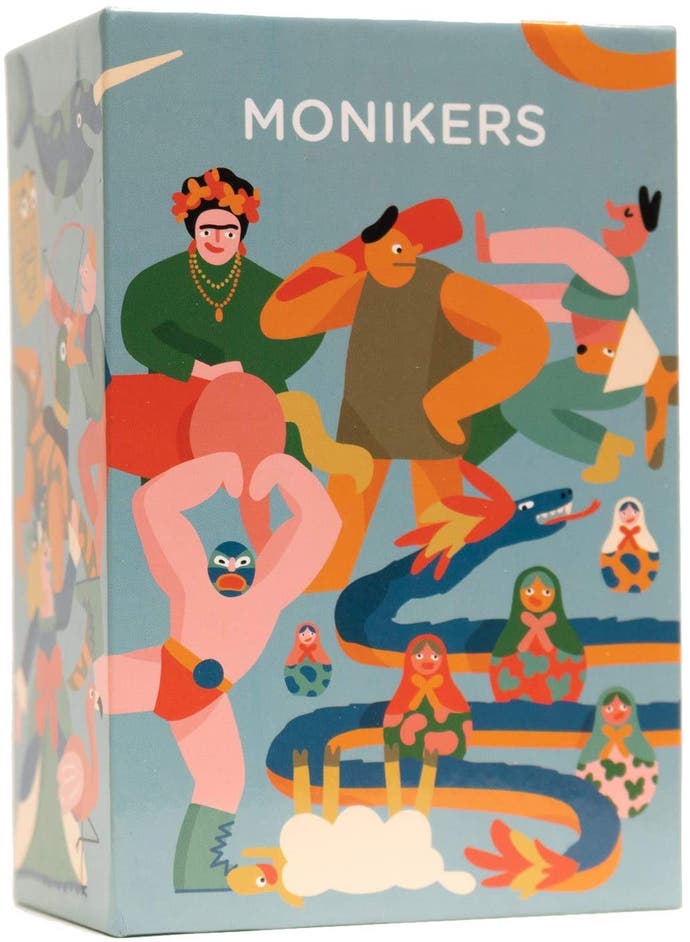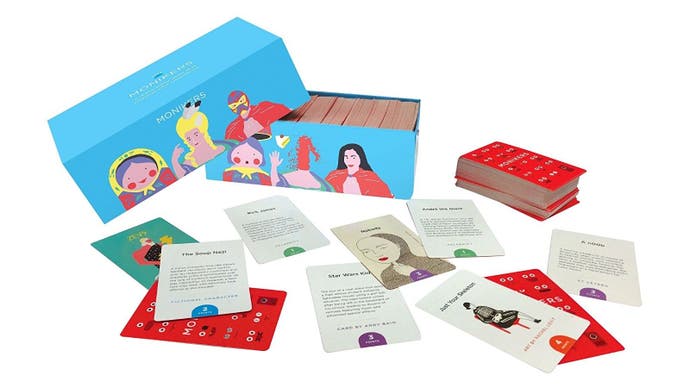Dicebreaker Recommends: Monikers, a hilarious party game that's perfect for holidays at home
Miming home for Christmas.
Dicebreaker Recommends is a series of monthly board game, RPG and other tabletop recommendations from our friends at our sibling site, Dicebreaker.
This time of year is usually synonymous with board games, as everyone gathers round to make noise and get silly with some classic party favourites. However, there's no denying that the festive season is going to be a little different this year. Due to the current COVID-19 pandemic, many people won't be seeing their friends and family in the flesh in the coming weeks. Obviously, this is going to make playing board games rather difficult. Nevertheless, this doesn't mean people can't find other ways to make merry with a hilarity-inducing bit of social gaming this December.
Thanks to the availability of video streaming software like Zoom and Google Meet, players have been finding ways of connecting with their loved ones for some tabletop fun all year. Whilst some games are more easily adapted to be played over webcam than others - I certainly wouldn't recommend trying Jenga - party games are one of the better choices when it comes to playing online. The simplicity of their rules and the focus on social interaction makes many a perfect fit for video calls, but none more so than Monikers.

Charades may be a holiday tradition for many people, but it tends to get boring pretty quickly. Monikers solves this particular problem by shaking up the classic guess-who/what formula with some unique little twists. Capable of supporting up to 16 players, Monikers has its players attempting to describe various peoples, places and things without using their actual names. This concept is nothing new in the tabletop world, considering the popularity of games such as Taboo and Articulate, but Monikers brings something new to the table.
Monikers feels modern in a way that a lot of the older and stuffier variations of classic party games don't. Many of the cards featured in the core box, as well as the subsequent expansions, list characters and concepts that people on social media might be familiar with: "Drunk Jeff Goldblum" and "Doge" both make an appearance. Whilst this might make it a bit trickier to play with people who do not regularly use the internet - like my parents - it does provide plenty of potential for referencing your favourite memes.
Monikers also prides itself on being accessible, with players getting the chance to pick which cards are placed in their team's deck, encouraged to skip any cards they do not understand and having a distinct lack of the kind of icky stuff you might find in a rubbish game like Cards Against Humanity.
Players are not stuck describing cards in exactly the same way throughout the entire game, as Monikers is split into three very different rounds. The very first round is simple enough, with each team of players taking it in turns to describe and guess their deck of cards - without using the name of the actual thing - within each allotted time frame. So far, so Taboo.
Things start getting wilder in the next round, however, as whoever is describing each card must only use a single word to do so. Having already gone through the same deck of cards in the previous round, players must attempt to say a word that their team might have previously used whilst discussing a particular card. Otherwise, players are welcome to say a word that references the card in a way they believe their team will recognise. Choosing either option is a gamble, but deciding the best way to communicate these concepts with such limitations is what makes Monikers especially fun to play.

The final round of Monikers is easily the most absurd, forcing the players to remain - almost - silent and rely entirely upon miming to describe their cards. Though the concept of this round is similar to charades, Monikers does a much better job because the cards themselves cover such specific ideas, making it doubly difficult - and entertaining - to attempt to describe them. Rather than simply acting out the main plot of a story or book, Monikers requires players to contort themselves in ways that no human being should in order to communicate its bizarre concepts. This is exactly how I ended up on my knees, with my arms around my head, making disturbingly graphic sucking noises in order to imitate what a Roomba might look and sound like.
Monikers knows exactly what it is doing when it asks players to pantomime its various cards, setting them up for total and complete humiliation.
If you're playing over a video call with a single copy, I'd recommend sending pictures of the cards to whoever is describing that game, or otherwise have the owner take the role of descriptor themselves. Either way, everything about Monikers - from the witty descriptions on the cards explaining things such as the apparently erotic relationship between Catherine the Great and her horse to the distinctive pop art style on the box - screams hilarity. Making it the perfect party game to play during the festive season - wherever you are.









